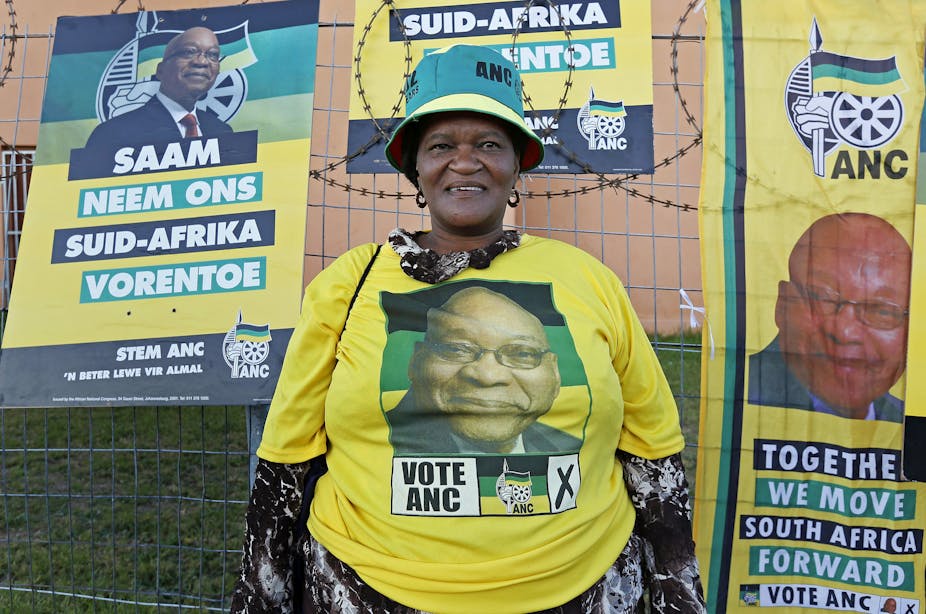The South African Constitutional Court’s unanimous decision declaring a set of municipal byelections invalid has sent ripples through the country.
The court found that the byelections in Tlokwe, Potchefstroom, were not free and fair, invalidating the original result. The ruling means that new byelections must be held in the affected wards in a municipality where the governing African National Congress’ (ANC) hold on power can be described as tenuous at best.
This timing of the ruling is further bad news for governing party. It has had a torrid 2015 and now faces local government elections early next year. These are likely to result in the ANC’s support falling below 60% nationally for the first time since the country’s first democratic elections in 1994. This would be a significant blow.
This year saw the party, which is in alliance with trade union federation Cosatu and the South African Communist Party, confronted with significant challenges. These included:
unprecedented parliamentary instability;
a divided tripartite alliance;
the split in Cosatu;
a faltering economy;
the increasingly dubious leadership of Jacob Zuma; and
the wide-ranging wave of student protests, characteristic of a distinctly unstable political environment.
Credibility of the electoral commission
The Constitutional Court’s verdict should be seen as an affirmation of the values of constitutionalism and democracy. But it also raises serious concerns about the impartiality of the Independent Electoral Commission ahead of next year’s local government elections.
These elections are scheduled for August 2016. This means that there is not a great deal of time in which to put in place the necessary complex logistical arrangements.
The Constitutional Court determined that the Tlokwe voters’ roll was not made available timeously to opposition parties and that it was also incomplete. Both are serious irregularities that blight the commission’s performance.
The court also found that unregistered voters were bussed in from other wards with instructions to vote for the ANC. This is illegal under South African electoral law.
These issues have raised fundamental questions about the commission’s ability to facilitate free and fair elections. And opposition parties have voiced concerns about collusion between the commission, the ANC and government structures.
As a political analyst who observed the 2012-13 Tlokwe byelections, I can attest to the fact that opposition parties made serious allegations of irregularities. These included claims that voters were bussed in from as far afield as the Free State, a neighbouring province, in an attempt to secure an ANC victory.
Why this particular byelection matters
Potchefstroom, like other urban and middle class municipal constituencies, carries distinct political risk for the ANC. Recent elections have seen a decline in support for the party in these areas. And it is likely that the ANC may lose control in quite a few.
The party lost control of the Tlokwe municipal council in 2013. This was after it had expelled 14 of its councillors for supporting a motion of no confidence against the erstwhile ANC mayor, Maphetle Maphetle.
The ANC proposed the merger of Tlokwe with neighbouring Ventersdorp, which has a dysfunctional governance structure. It wants the merger, which has been approved by the Municipal Demarcation Board, to go through before the local elections next year. This is being viewed as a political manoeuvre to limit the risk of it losing control of the area.
The Constitutional Court verdict requires new byelections to be held within 90 days. This means that the re-run byelection will take place before the local government elections next year.
Threat of instability
The town of Potchefstroom is poised for a tumultuous time in the next six to eight months.
First, there is the distinct possibility that the ANC could be dethroned in a re-run of the local byelection following the Constitutional Court verdict.
Second, the run-up to the local government elections is likely to exacerbate instability related to the unpopular Ventersdorp amalgamation. Opposition parties have smelled blood. And fireworks can certainly be expected with radical actors like the Economic Freedom Fighters entering the fray.
Third, more volatility can be expected when universities reopen in late January and early February for the 2016 academic year. There is little doubt that the Potchefstroom campus of the North-West University will be hit by student movements aiming to replicate this year’s protests.
I believe that the anticipated student uprisings will add fuel to the fire of South Africa’s current unstable and uncertain political situation.
With the numerous existing faultlines and the prospect of a tipping point closing nearer, South Africa’s political landscape may be fundamentally changed by a single swallow heralding the advent of spring – perhaps even an Arab Spring.

